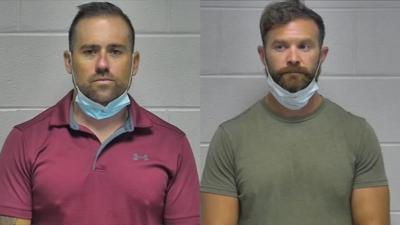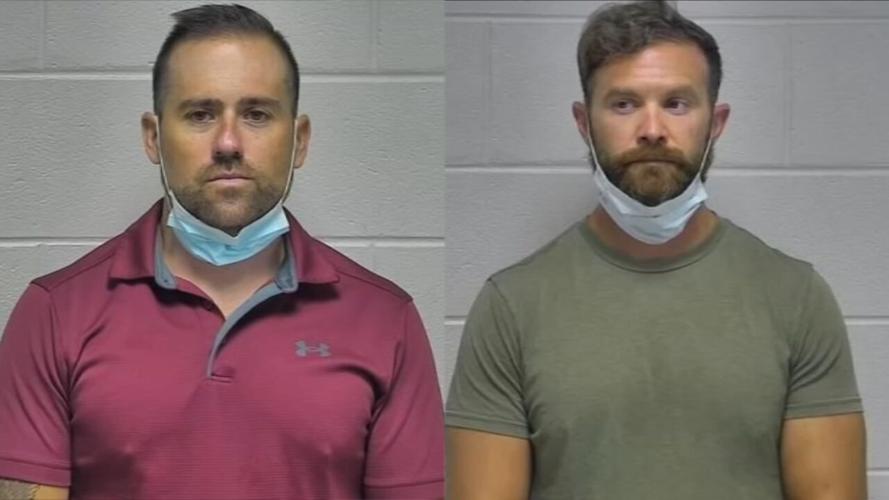LOUISVILLE, Ky. (WDRB) -- The prosecution is asking a federal judge not to dismiss the most serious charges against former Louisville Metro Police Detective Joshua Jaynes and Sgt. Kyle Meany, arguing that had they not lied on a search warrant affidavit in March 2020, Breonna Taylor would be alive today.
Jaynes and Meany have been accused of providing and lying about false information in a search warrant used by police to burst into Taylor's house on March 13, 2020, resulting in her death.
"The Jefferson County Circuit Court Judge who reviewed the affidavit and signed the warrant for Taylor's home was not aware at the time she approved the warrant that the affidavit contained false and misleading statements or that it omitted material information," according to a motion filed on Feb. 14. "If the defendants had not intentionally misled a judge with a false affidavit, there would have been no search warrant for officers to execute and no fatal shooting."
The federal indictment includes a felony allegation that Meany and Jaynes knew officers would be using dangerous weapons to execute the warrant, which resulted in Taylor's death.
Defense attorneys Brian Butler and Thomas Clay, who represent Meany and Jaynes respectively, have filed motions asking for that part of the indictment to be dismissed, which would lower the charges to misdemeanors carrying a potential maximum penalty of one year in prison.
Under the current indictment, the former officers face a maximum sentence of life in prison if convicted. A trial date has not yet been scheduled.
In August, a federal judge dismissed the felony charges facing Meany and Jaynes. In essence, U.S. District Court Judge Charles Simpson ruled Taylor's boyfriend's initial gunshot he fired at police was the "legal cause of her death" — not an improper warrant that authorized the raid.
But in October, the two were indicted again with prosecutors hoping to get around Simpson's ruling, in part by adding a focus on key information Jaynes and Meany allegedly withheld from other officers during the planning and execution of the raid, putting both officers and anyone in Taylor's home in danger.
And the so-called "superseding" indictment again included a variation of the language that Meany and Jaynes knew that the warrant would be executed "at night by other LMPD officers brandishing firearms" causing Taylor's death, making the charge a felony.
On Friday, prosecutors supplemented their motion, arguing the two officers filed the false affidavit "knowing that they would send officers to execute it in a manner that created a heightened risk of a gunfight."
Meany and Jaynes knew Kentucky had a "stand your ground law" allowing residents of a home to shoot when surprised by intruders, yet still let police burst in without knowledge of Walker's presence, according to the motion.
"Routine searches are not conducted late at night at the homes of innocent people, based on false warrants, in violation of department policies, hidden from fellow officers, and conducted without warning the officers executing the warrant that they may encounter an armed man inside," according to the motion.
Meany and Jaynes were not at the scene of the raid.
Butler points out that "Meany is not alleged to have used a weapon to obtain a Judge's approval for the search warrant of Taylor's residence, nor is it alleged that anyone aided and abetted him in obtaining this approval by using a weapon."
And he contends that other officers executing the search warrant being armed "has nothing to do with the alleged constitutional violation of presenting a flawed search warrant affidavit."
"The Government cannot seriously contend that an occupant's shooting at police officers is a natural and probable result of a warrantless search," Butler wrote.
Jaynes and Meany were charged with presenting false information in a search warrant affidavit, presented to former Jefferson Circuit Judge Mary Shaw, including that a postal inspector verified that drug suspect Jamarcus Glover, who had previously dated Taylor, was using Taylor's home to receive parcels.
In fact, Tony Gooden, a U.S. postal inspector in Louisville, told WDRB News in May 2020 that Louisville police didn't confer with his office. He said a different law enforcement agency asked his office in January 2020 to investigate whether any potentially suspicious mail was going to the unit. The local office concluded that there wasn't.
And Jaynes swore that he had observed Glover make "frequent trips" to Taylor's home, according to the new indictment. But, in fact, Jaynes and Meany had only seen Glover at the home one time, months before the March 13, 2020, raid, prosecutors allege.
"If the judge had been aware that key statements in the affidavit were false and misleading, she would not have approved the warrant for Taylor's home and there would not have been a search at Taylor's home," according to the indictment.
The charges Simpson previously dismissed involved using a dangerous weapon to deprive Taylor of her Fourth Amendment right to be free from unreasonable search.
In his ruling, Simpson said the "tragedy of Breonna Taylor's death and the gravity of her family's grief are not lost on the court."
However, in this case, "the alleged facts do not fit the felony offenses as written."
Taylor was killed when Walker fired a shot after police burst in early in the morning as part of a series of searches revolving around a drug dealer who had once dated Taylor. Walker has said he thought the couple were being robbed. Police fired 32 shots in response, killing Taylor.
Police were looking for money or drugs involving Jamarcus Glover, who was at the center of a narcotics probe by Louisville police. The warrant for Taylor's home was executed around the same time that police served other warrants on suspected drug houses in the city's west end — some 10 miles away.
No drugs or money were found in the 26-year-old's home.
Another former officer, Kelly Goodlett, has already pleaded guilty to conspiracy for knowingly including false information in the search warrant affidavit used to raid Taylor's home and then conspiring with Jaynes to cover it up.
Prosecutors said Goodlett and Jaynes knew false information was in the search warrant affidavit when it was presented to a judge and that other information was stale.
Jaynes' indictment claims that in April or May 2020 he tried to get an LMPD officer identified as "J.M." to say that he had previously told Jaynes that Glover had been receiving packages at Taylor's home. However, "J.M." had told Jaynes in January of that year that he had no information to support that, according to the indictment.
The indictment says Jaynes and Goodlett provided a "false Investigative Letter" to criminal investigators around May 1, 2020.
Jaynes later texted Goodlett that a criminal investigator wanted to meet with him after Gooden's account refuting the information in the warrant affidavit was reported, according to the indictment.
The indictment says Jaynes and Goodlett met the night of May 17, 2020, in Jaynes' garage, where Jaynes allegedly told Goodlett "that they needed to get on the same page because they could both go down for putting false information in the Springfield Drive warrant affidavit."
Goodlett has pleaded guilty and is expected to work with prosecutors and possibly testify against other officers. She will not be sentenced until the trials of the other three officers have concluded.
The former detectives who fired the shots that struck Taylor — John Mattingly and Myles Cosgrove — were not charged because they didn't know about the false information in the search warrant.
Breonna Taylor Coverage:
- Judge declines request from Brett Hankison's attorneys to talk with jurors in Breonna Taylor case
- Jury finds LMPD detective Brett Hankison guilty of violating Breonna Taylor's civil rights
- Judge in Breonna Taylor case won't let jurors hear of Brett Hankison's prior 'aggressive' acts
- DOJ appeals dismissal of most serious charges against 2 officers involved in Breonna Taylor raid
Copyright 2025 WDRB Media. All Rights Reserved.














